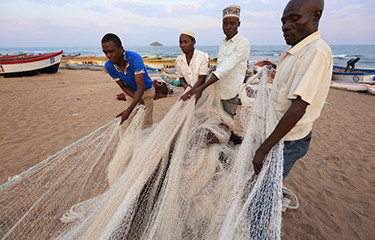Malawi’s efforts to turn around its fisheries and aquaculture sector has received a major boost after the African Development Bank (AfDB) approved USD 13.2 million (EUR 11.8 million) in loans and grants to support sustainable capture fisheries, aquaculture development, and to revamp the country’s fish value chains.
AfDB’s financial support, which was approved in early October, includes USD 8.98 million (EUR 8.09 million) from the African Development Fund and a USD 4.21 million (EUR 3.79 million) grant. The government of Malawi, which reduced its budget for the Ministry of Agriculture by 12 percent in the 2018-2019 fiscal year, will provide USD 1.38 million (EUR 1.24 million) for the Sustainable Capture Fisheries, Aquaculture Development and Watershed Management project.
In the last financial year, Malawi’s Ministry of Agriculture was allocated USD 206.6 million (EUR 186.1 million) of the country’s USD 2 billion (EUR 1.8 billion) national budget, or an equivalent of 10.13 percent of total budget, which is less than the USD 233 million (EUR 209 million) it was allocated the previous financial year.
Although the national budgetary allocation is within the 2003 Maputo declaration on agriculture and food security, a large share of the ministry’s budget is for recurrent expenditure, hence the importance of external financing to support the fisheries and aquaculture department, which provides 70 percent of dietary animal protein in Malawi and also directly employs more than 400,000 people.
With the AfDB financing, Malawi forecasts an increase in fish production with the construction and rehabilitation of several landing sites, acquisition of refrigerated trucks, and development of fish markets and processing facilities in addition to revamping fisheries research and upgrading road transport for market access.
The project, the bank said, will “contribute to nutritious diets, boost employment along the fish value chain and build climate resilience along watersheds.”
At least 20,000 people in 11 districts within the Lake Malawi basin and others within three outlying districts will benefit directly from the project, which also entails the “promotion of commercial aquaculture ventures, integrated pond-based aquaculture systems and various pilots in selected areas as an adaptive measure to the changing offshore fisheries.”
Another 250,000 people, such as the fish processors, retailers, vendors, and interns from training centers stand to benefit from the project as well. The project is expected to be at the heart of the implementation of Malawi’s National Fisheries and Aquaculture Policy.
At the project sites where fisheries and aquaculture components will be implemented, the Malawi Bureau of Standards “will also be engaged to ensure that national and international standards are attained and thereby enhance food safety that is compliant with phyto-sanitary measures and Hazard Analysis and Critical Control Point (HCCAP).”
Photo courtesy of Dietmar Temps/Shutterstock







